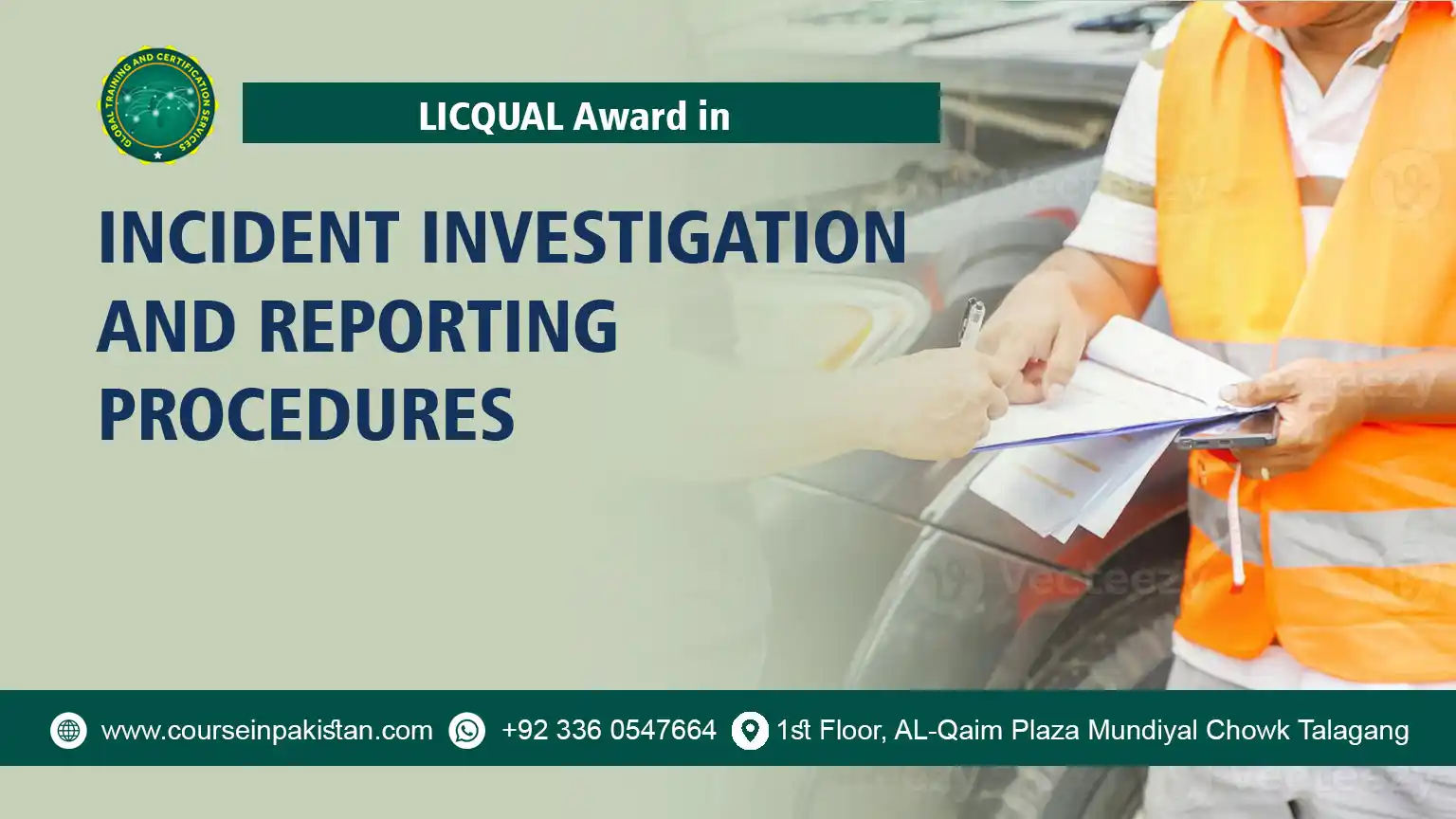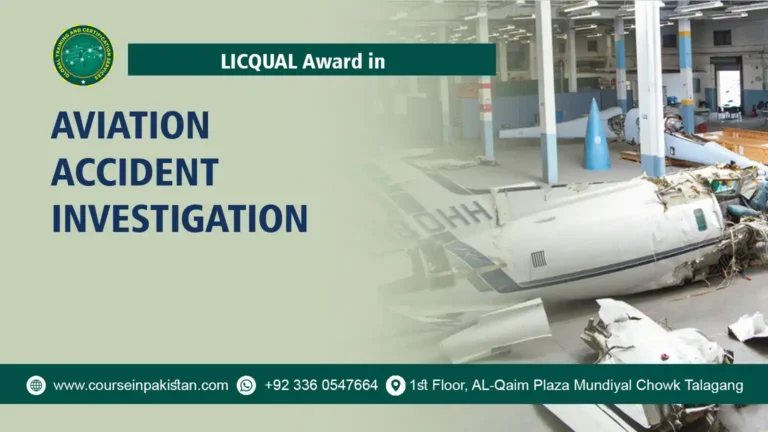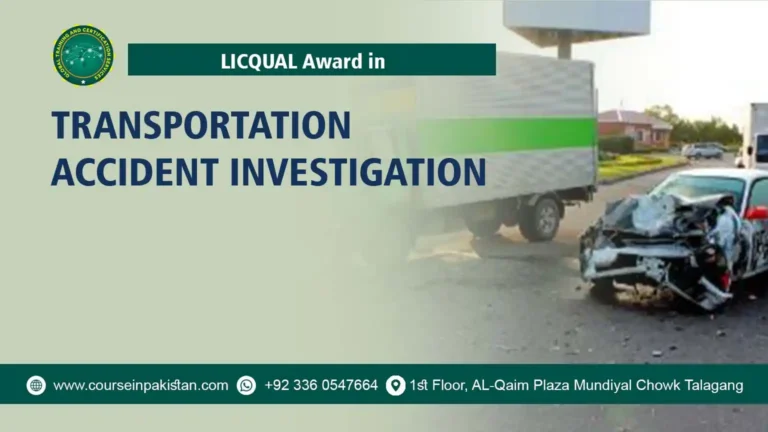
Award in Incident Investigation and Reporting Procedures
In every industry, incidents can occur that jeopardize safety, operations, and regulatory compliance. The Award in Incident Investigation and Reporting Procedures is designed to equip professionals with the essential skills to conduct thorough investigations, analyze root causes, and effectively communicate findings. This course emphasizes proactive measures to prevent incidents and promote a culture of safety within organizations.
Course Introduction
The Award in Incident Investigation and Reporting Procedures addresses the critical need for comprehensive incident management and reporting skills across various sectors. Participants will learn systematic approaches to investigate incidents, gather evidence, and document findings to enhance organizational resilience and regulatory compliance.
Course Overview
Participants will engage in a structured curriculum that combines theoretical knowledge with practical applications. The course covers essential aspects of incident investigation, including legal frameworks, evidence preservation, root cause analysis, and effective reporting. Through case studies and interactive exercises, participants will develop proficiency in identifying causal factors, recommending corrective actions, and fostering continuous improvement.
Course Benefits
- Enhanced Incident Response: Acquire the skills to effectively manage and respond to incidents, minimizing impact and recurrence.
- Regulatory Compliance: Understand legal requirements and best practices for incident reporting and documentation.
- Organizational Resilience: Implement proactive measures to prevent incidents and promote a safer work environment.
- Career Advancement: Gain a recognized qualification that enhances credibility and career opportunities in health and safety, risk management, and compliance roles.
Course Study Units
The Award in Incident Investigation and Reporting Procedures typically includes study units such as:
- Introduction to Incident Investigation and Reporting
- Incident Investigation Techniques and Tools
- Legal and Ethical Considerations in Incident Reporting
- Data Collection and Preservation
- Root Cause Analysis in Incident Investigation
- Effective Interviewing and Communication Skills
- Developing Incident Investigation Reports
- Incident Trend Analysis and Preventive Measures
- Incident Management and Response Procedures
Learning Outcomes
Introduction to Incident Investigation and Reporting
Learning Outcomes:
- Understand the importance of incident investigation and reporting in organizational safety and compliance.
- Identify key stakeholders and their roles in incident management and reporting processes.
- Recognize initial steps and protocols required to initiate effective incident investigations.
Incident Investigation Techniques and Tools
Learning Outcomes:
- Apply systematic incident investigation techniques and methodologies.
- Utilize specialized tools and technologies for gathering and analyzing incident data.
- Enhance proficiency in documenting investigation processes and outcomes.
Legal and Ethical Considerations in Incident Reporting
Learning Outcomes:
- Comprehend legal frameworks and ethical considerations related to incident reporting.
- Explain organizational and individual responsibilities in reporting incidents.
- Apply knowledge of legal requirements to ensure compliance and mitigate risks.
Data Collection and Preservation
Learning Outcomes:
- Employ effective techniques for collecting, documenting, and preserving incident data and evidence.
- Ensure adherence to chain of custody procedures to maintain data integrity and admissibility.
- Organize and present data systematically to support investigation findings and regulatory requirements.
Root Cause Analysis in Incident Investigation
Learning Outcomes:
- Apply root cause analysis methodologies, such as Ishikawa diagrams or 5 Whys, to identify underlying causes of incidents.
- Analyze contributing factors including human error, equipment failure, and organizational deficiencies.
- Recommend corrective actions and preventive measures based on root cause analysis findings.
Effective Interviewing and Communication Skills
Learning Outcomes:
- Apply structured interviewing techniques to gather accurate and comprehensive information from witnesses and stakeholders.
- Develop effective communication skills to convey investigation findings clearly and persuasively.
- Build rapport and manage interpersonal dynamics to facilitate productive interviews and discussions.
Developing Incident Investigation Reports
Learning Outcomes:
- Develop clear, concise, and objective incident investigation reports that document methodologies, findings, and conclusions.
- Structure reports to effectively communicate investigation processes and outcomes to stakeholders and regulatory authorities.
- Ensure accuracy and completeness in reporting to support informed decision-making and organizational learning.
Incident Trend Analysis and Preventive Measures
Learning Outcomes:
- Conduct incident trend analysis to identify patterns, trends, and systemic issues across incidents.
- Propose preventive measures and safety improvements based on incident data and trend analysis.
- Implement continuous improvement initiatives to mitigate risks and prevent recurrence of incidents.
Incident Management and Response Procedures
Learning Outcomes:
- Implement incident management and response procedures effectively during emergency situations.
- Coordinate resources and stakeholders to minimize impact and ensure swift recovery.
- Evaluate incident response effectiveness and make recommendations for future improvements.
These learning outcomes equip participants with the knowledge and skills necessary to conduct thorough incident investigations and develop effective reporting procedures. By mastering these study units, professionals are prepared to enhance organizational safety, ensure regulatory compliance, and foster a culture of continuous improvement and incident prevention.
Who is This Course For?
The Award in Incident Investigation and Reporting Procedures is suitable for:
- Health and safety professionals responsible for incident management and workplace safety.
- Managers and supervisors involved in risk management, compliance, and operational safety.
- Quality assurance professionals seeking to enhance incident reporting and investigation skills.
Future Progression for This Course
Successful completion of the Award in Incident Investigation and Reporting Procedures lays a solid foundation for career advancement and specialization. Graduates may pursue advanced certifications in specific industries or disciplines such as occupational health and safety, environmental management, or quality assurance. Additionally, this qualification prepares individuals to lead incident investigation teams, develop organizational policies, and contribute to strategic risk management initiatives.
Award in Incident Investigation and Reporting Procedures equips participants with essential skills to manage incidents effectively, ensure regulatory compliance, and promote a culture of safety within organizations. By mastering incident investigation and reporting procedures, professionals play a pivotal role in safeguarding employees, enhancing operational resilience, and maintaining stakeholder trust.





